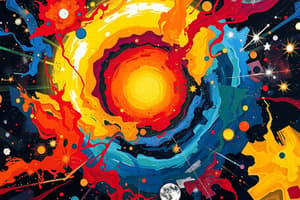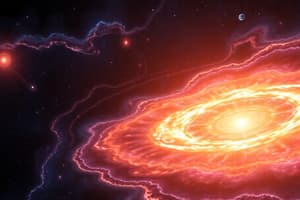Podcast
Questions and Answers
According to the Big Bang theory, how did the universe begin?
According to the Big Bang theory, how did the universe begin?
- As a series of rapid expansions
- As a result of a collision between two galaxies
- As an already existing vast expanse of space
- As a hot and infinitely dense point (correct)
What is the Planck epoch?
What is the Planck epoch?
- A stage dominated by radiation after the Big Bang (correct)
- A period following the formation of galaxies
- The stage when matter first existed in the universe
- The era defined by key events shaping the universe
What resulted from the end of the Planck epoch?
What resulted from the end of the Planck epoch?
- Expansion of space and time
- Formation of galaxies
- Gravity splitting away from the superforce (correct)
- Emergence of life forms
What is defined by key events shaping the universe?
What is defined by key events shaping the universe?
What dominated the radiation era right after the Big Bang?
What dominated the radiation era right after the Big Bang?
How long ago did the Big Bang occur according to the text?
How long ago did the Big Bang occur according to the text?
During which epoch did the universe rapidly expand from the size of an atom to the size of a grapefruit?
During which epoch did the universe rapidly expand from the size of an atom to the size of a grapefruit?
What was the first chemical element created in the universe?
What was the first chemical element created in the universe?
In which epoch did the universe cool down enough for quarks to bind together and form protons and neutrons?
In which epoch did the universe cool down enough for quarks to bind together and form protons and neutrons?
Which epoch was characterized by the fusion of protons and neutrons to create nuclei?
Which epoch was characterized by the fusion of protons and neutrons to create nuclei?
What process helped create the universe's second element, hydrogen, during the atomic epoch?
What process helped create the universe's second element, hydrogen, during the atomic epoch?
Which stage in the universe's development is characterized by the formation of stars?
Which stage in the universe's development is characterized by the formation of stars?
What caused a tremendous ripple effect and helped shape almost all the remaining elements in the universe?
What caused a tremendous ripple effect and helped shape almost all the remaining elements in the universe?
Flashcards are hidden until you start studying
Study Notes
Big Bang Theory
- The universe began approximately 13.8 billion years ago through an explosive event known as the Big Bang.
- The Planck epoch marks the earliest period in the history of the universe, lasting from T=0 to about 10^-43 seconds after the Big Bang.
Planck Epoch
- No known physical laws describe the conditions during the Planck epoch, making it a limit for current scientific understanding.
- The end of the Planck epoch led to the emergence of fundamental forces and particles.
Key Events Shaping the Universe
- Key events influencing the universe include cosmic inflation, baryogenesis, and nucleosynthesis, which established the framework for cosmic structure.
Radiation Era
- The radiation era immediately following the Big Bang was dominated by high-energy radiation, such as photons, with matter contributing less significantly.
Timeline of the Big Bang
- The Big Bang occurred around 13.8 billion years ago, establishing the timeline for cosmic evolution.
Rapid Expansion
- The universe underwent a rapid expansion during the inflationary epoch, expanding from the size of an atom to the size of a grapefruit in a fraction of a second.
First Chemical Element
- Hydrogen was the first chemical element synthesized in the universe, emerging shortly after the Big Bang during the nucleosynthesis phase.
Cooling Epoch
- The universe cooled sufficiently for quarks to combine and form protons and neutrons during the hadronic epoch.
Nucleosynthesis Epoch
- The nucleosynthesis epoch was characterized by the fusion of protons and neutrons to create light nuclei, including hydrogen and helium.
Atomic Epoch
- The atomic epoch facilitated the creation of hydrogen through recombination, when electrons combined with protons to form neutral hydrogen atoms.
Formation of Stars
- The formation of stars marks a significant stage in the universe’s development when matter began to clump together under gravity, leading to the birth of celestial objects.
Element Production
- Supernova explosions and stellar nucleosynthesis caused vast ripple effects, ultimately contributing to the formation of almost all remaining elements in the universe.
Studying That Suits You
Use AI to generate personalized quizzes and flashcards to suit your learning preferences.




